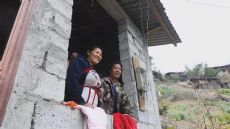| |
 Poverty in Yunnan's ethnic groups becomes thing of past Poverty in Yunnan's ethnic groups becomes thing of past
|
 |
2/22/2021

  
In November 2020, the prefecture declared a final victory over extreme poverty.
Ci Asheng and his family lived in a bungalow for 20 years. His family moved into an apartment in March 2020, provided for free to those living below the poverty line.
The home is equipped with modern appliances and basic furniture.
"We used to live in a shabby house on the mountain. But things have improved a lot in this new place. We like the whole design, and we like our new homes," he said.
Communities here offer training programs, like cooking, bamboo weaving, baseball manufacturing and motorbike repairs to help locals with job opportunities.
In Dulongjiang County, home to Derung ethnic people, better life is also on the road ahead.
Meng Xinwen now enjoys making pancakes for his breakfast in his newly-built kitchen. It is equipped with electrical appliances, but retains a traditional fireplace.
"There have been many changes. With the government support, I was able to build a new kitchen and a new bathroom. I've bought machines to help remove the grass on my caoguo fields. With the newly renovated road, it's much easier to travel around," he said.
Back in 2016, they lived below the national poverty line. They planted two hectares of caoguo, or red cardamom, as their main livelihood, making around 300 dollars a year.
As production levels rose, so did the family's earnings. Along with government allowance and subsidies, their annual income has risen to 16,000 dollars per person.
Southwest China's Yunnan Province had the country's largest poor population at the end of last year. It has eradicated absolute poverty. The last nine counties in the province were removed from the poverty-stricken county list, which meant all its 88 poverty-stricken counties have shaken off poverty. It also marks that the 11 ethnic minority groups with relatively smaller populations in the province have bid farewell to poverty.
|

|
 |
|

|